广州牛津英语7七年级下unit 3 复习二
广东省广州市牛津深圳版2017年七年级下册Unit3系统复习
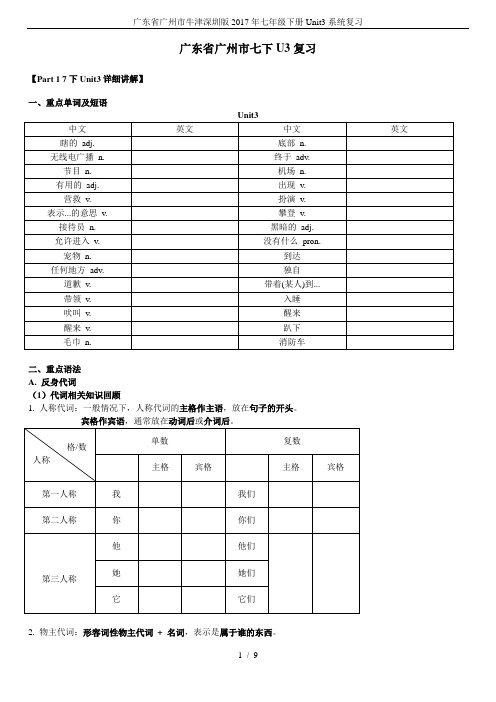
广东省广州市七下U3复习【Part 1 7下Unit3详细讲解】一、重点单词及短语二、重点语法A. 反身代词(1)代词相关知识回顾1. 人称代词:一般情况下,人称代词的主格作主语,放在句子的开头。
2. 物主代词:形容词性物主代词+ 名词,表示是属于谁的东西。
(2)反身代词的用法1、作宾语,有些动词需有反身代词:absent, bathe, amuse, blame, dry, cut, enjoy, hurt, introduce, behave等如:We enjoyed ourselves very much last night. 我们昨晚玩得很开心。
Please help yourself to some fish. 请你随便吃点鱼。
He thinks more of others than of himself.2、用于及物动词+宾语+介词: take pride in, be annoyed with, help oneself to sth.I could not dress (myself) up at that time.那个时候我不能打扮我自己。
3、作表语, 同位语be oneself: I am not myself today. 我今天不舒服。
The thing itself is not important. 事情本身并不重要。
4、反身代词有以下常见搭配enjoy oneself = have a good time 玩的开心;过得愉快by oneself = alone 某人自己help oneself to…请随便吃...;请自便...learn sth. by oneself = teach oneself sth. 自学5、在不强调的情况下,but, except, for 等介词后宾语用反身代词或人称代词宾格均可。
如:No one but myself (me) is hurt.注意:(1) oneself 有单复数之分I enjoy myself.Children, help yourselves to some fish.(2) 有些动词后不跟反身代词,get up, sit-down, stand up, wake up等。
Unit3知识点整理牛津译林版七年级英语下册

7B Unit3 Wele to Sunshine Town 知识点整理1.等一会儿wait/just a minute2.足以做某事be enough for sth. be enough to do sth.3.点一个披萨order a pizza4.来自英国的一群交换留学生 a group of exchange students from the UK5.观看一些精彩的电影watch some wonderful films6.我们学校的足球场our school’s football field7.邀请他们和我们一起吃饭invite them to have dinner with us8.尝一些中国食物try some Chinese food9.关于阳光镇的视频 a video about Sunshine Town10.为某事做准备prepare for sth =get ready for sth.11.坐地铁by underground (介词短语)take the/an underground (动词短语)12.在镇中心in the town center = in the center of the town13.因为...著名be famous for 作为...著名be famous as14.全面了解中国历史learn all about China’s history15.期待/盼望(做)某事look forward to (doing) sth16.观看京剧watch Beijing opera17.到处都是all over the place18.在故宫博物馆的一天 a day at the Palace Museum19.金銮宝殿the golden throne20.艺术品works of art21.中国画Chinese paintings22.更多many more+可数名词复数much more+不可数名词/比较级23.为出行制定计划make plans for a visit24.在湖面上划船row a boat on the lake25.在农场on a farm26.互相了解know each other27.享受某人的生活enjoy one’s life28.hear/see.watch/feel/notice sb. do sth. 经常性,反复性;整个过程hear/see.watch/feel/notice sb. doing sth. 正在进行29.我的一个老朋友要来看我。
牛津译林版英语七年级下册Unit3知识点精讲(下)

U3基础知识梳理(下)面对这种情景,我们情何以堪?我们能为阻止这些事情做些什么?一、词汇Words1. postcard n明信片.(1)postcard用作名词,表示“明信片”之意,可数,其复数形式是.例:我请他寄一张明信片给那位交流生。
在这样的环境中,我们可以环境污染在这样的环境中,我们。
1 / 122. key n 钥匙,答案,键,关键key用作名词,意为“钥匙;答案;关键”,其复数形式是。
(1)key表示“钥匙”之意时,常用“这个门的钥匙”固定搭配。
例:我没有前门的钥匙。
(2)key表示“答案”之意时,常用“这个问题答案”固定搭配。
例:我知道第一个问题的答案。
(3)key 表示“键”之意时,是指电脑、打字机、钢琴等“键盘上”的“键”。
例:这个键盘上有六排键。
(4)key 也可以用作名词,表示“关键”性的人或人事。
例:那个人可能是这个学校的关键人物。
3.ring n 环,圈;戒指(1)ring用作名词,表示“环;圈;戒指”,是可数名词,其复数形式是例:桌子上的指环不是我的。
(2)ring例:他经常星期天给我打电话。
4.all over 到处,遍及(1)all over 表示“到处”之意时,与副词everywhere 意义接近。
例:孩子们全身都湿透了。
(2)all over 表示“遍及”之意时,相当于介词throughout ,后面要接名词、代词等作宾语:“全世界”.例:全中国已经发生了巨大的变化。
全世界的儿童都喜欢看电视。
(all over)________________________________________________5.raise vt 饲养,使升高(1)raise ,及物动词,表示“饲养”,后接“饲养”的动物名称。
例:妈妈养了很多猪。
(2)raise ,及物动词,也可表示“使升高”,后接“使升高”的人、物等。
例:最后他提高了声音。
批注:[辨析] rise, raiserise(rose, risen)vi. 上升,升起, 升高;上涨;站起来。
牛津英语译林版七年级下册7下 Unit 3 单元复习(包含答案)

7下Unit 3 单元复习一、单项选择I. Mum often has a lol of housework ______ before the Spring Festival.A. to doB. doingC. is doingD. does2. Millie is a good swimmer, and she can swim ______ a fish.A. likesB. likeC. is likeD. /3. It ______ Millie ten minutes ______ go to school every day.A. take; toB.take; /C. takes; toD. takes; /4. —______ is your hometown from here? —About two hours by car.A. How longB. How farC. How manyD. How much5. My ______ home is far from ______.A. grandparent’s; ourB. grandparents’ ourC. grandparents; oursD. grandparents’ ours6. —______ cap is that? —It’s his.A. WhoB. Who’sC. WhoseD. What7. You enjoy ______. Why not______ a song for us at the birthday party?A. singing; singingB. singing; singC. to sing; singingD. to sing; sing8. —Would you like to see the works of art with us? —______A. No, I don't.B. Yes, I do.C. OK.D. Yes, please.9. ―The World Cup is coining. I won't ______ any game! —I'm looking forward to ______ every match of it, too.A. miss; watchingB. miss; watchC. seeing; missingD. see; miss10. Will you go to the zoo ______ your new bicycle?A. fromB. onC. byD. with11. Welcome to my home. Would you like ______ coffee?A. someB.anyC. manyD. much12. —David, you left your English book on the desk. ―It isn't ______. I think it is ______.A. mine; Nick'sB. mine; NickC. my; Nick'sD. my; Nicks’13. —Shall we go for a walk in the park after dinner? —______A. I have no time.B. You are welcome.C. It’s a good idea.D. Yes, I know.14. —Welcome to our restaurant. What can I do for you? —I want to___________a bowl of noodles.A. makeB. cookC. raiseD. order15. —______ your hometown like? —It’s a good place ______.A. How's; to liveB. How does; livingC. What's; to liveD. What does; living二.完形填空A driver gets lost (迷路)on his way to Denver. He ___1___ in front of a farmhouse on the side of the road. He gets out and knocks at the door. A very old woman ___2___ the door. The driver asks her how to get to Denver.“Sorry, I don’t know how to get there,”the woman says. The driver feels ___3___. He gets back in his car and ___4___ away. Then he hears ___5___ shouting. He looks in his rearview mirror (后视镜). The woman and ___6___ old man are waving(招手) for him to come back.“The old man ___7___ know how to get there!” the driver says to ___8___ . He ___9___ his car around and drives back to them. When the driver gets ___10___ the car again, the old woman says:“This is my husband. He doesn’t know how to get there either.”1. A. comes B. stops C. gets D. walks2. A. closes B. asks C. answers D. knocks3. A. sad B. happy C. surprised D. interested4. A. leaves B. rides C. drives D. runs5. A. anyone B. someone C. everyone D. no one6. A. the B.a C./ D. an7. A. can B. can't C. must D. mustn't8. A. himself B. him C. herself D. her9. A. drives B. looks C. starts D. turns10. A. out B. out of C. into D. on三.阅读理解AI am Peter. I live with my grandparents in a small village (村庄).There are some hills and a river near the village. On the hills, there are many fruit trees and beautiful flowers. I often go walking with my fhends in the hills. The river is shallow, so it is safe (安全的)for us to swim in it. The people here grow wheat and vegetables and they also raise cows and pigs. We live in a small house. There is a pool in front of our house.The people in the village are very friendly and they know each other. They like doing sports very much. The old people like to play t’ai chi ch’uan (太极拳). The young people like to play basketball and table tennis. There is a cinema in the centre of the village. Ifs free to all the villagers (村民),but it opens only at the weekend.I have many friends in the village. I like the quiet and happy life here. I think it's a wonderful place to live.1. Where does Peter live?A. In a small village.B. In a small city.C. In a big city.D. In a small town.2. What does the underlined word “shallow” mean in Chinese?A.浅的B.深的C. 脏的D. 湍急的3. What do the young people like doing?A. Playing t'ai chi ch'uan.B. Playing table tennis and basketball.C. Playing basketball and tennis.D. Playing table tennis and badminton.4. Where is the cinema?A. In the city.B. Near the village.C. In the centre of the village.D. In front of our house.5. Which of the following is true?A. Peter lives with his parents.B. Peter often swims in the pool.C. The cinema ticket is a little expensive.D. The villagers can go to the cinema at the weekend.BSpaceships, dinosaurs and mummies (木乃伊)… You usually only see these things in films. But if you visit a museum, you may get to see them for real!A museum is a wonderful place. You can always find something new in different museums. It helps open up your world. For example, how fast can a velociraptor(迅猛龙) run? How do astronauts(宇航员) land when they come back to the Earth? Do you know that Leonardo da Vinci is not only a great artist, but also a great inventor?Many of you may come across something new in a museum. You can go home and look it up online or in books. Has this ever happened to you? Museums help us learn about things outside of school. What’s most interesting is that there are museums for almost everything. There are museums for cats, Teddy bears and even hair! And there’s almost always one close by. Does a trip to a museum sound fun to you?6. This passage describes______.A. dinosaursB. mummiesC. filmsD. museums7. From the second paragraph, we know that______.A. museums have everything you needB. a vclociraptor can run fastC. astronauts can't walk after spending a long time in spaceD. Leonardo da Vinci is an artist and also an inventor8. The underlined phrase "comc across" means "______".A. cross the roadB. findC. listen toD. come to9. Which of the following museums is NOT mentioned in the passage?A. A museum for cats.B. A museum for hair.C. A museum for Teddy bears.D. A museum for balls.10. What can we learn from the last paragraph?A. Museums can help us with our studies.B. Every student should visit museums.C. There are many kinds of museums.D. Museums are better than theatres.四. 填空A) 根据括号中所给汉语写出单词,使句子意思完整正确。
牛津英语译林版七年级下册7下Unit3单元复习(包含答案)

⽜津英语译林版七年级下册7下Unit3单元复习(包含答案)7下Unit 3 单元复习⼀、单项选择I. Mum often has a lol of housework ______ before the Spring Festival.A. to doB. doingC. is doingD. does2. Millie is a good swimmer, and she can swim ______ a fish.A. likesB. likeC. is likeD. /3. It ______ Millie ten minutes ______ go to school every day.A. take; toB.take; /C. takes; toD. takes; /4. —______ is your hometown from here? —About two hours by car.A. How longB. How farC. How manyD. How much5. My ______ home is far from ______.A. grandparent’s; ourB. grandparents’ ourC. grandparents; oursD. grandparents’ ours6. —______ cap is that? —It’s his.A. WhoB. Who’sC. WhoseD. What7. You enjoy ______. Why not______ a song for us at the birthday party?A. singing; singingB. singing; singC. to sing; singingD. to sing; sing8. —Would you like to see the works of art with us? —______A. No, I don't.B. Yes, I do.C. OK.D. Yes, please.9. ―The World Cup is coining. I won't ______ any game! —I'm looking forward to ______ every match of it, too.A. miss; watchingB. miss; watchC. seeing; missingD. see; miss10. Will you go to the zoo ______ your new bicycle?A. fromB. onC. byD. with11. Welcome to my home. Would you like ______ coffee?A. someB.anyC. manyD. much12. —David, you left your English book on the desk. ―It isn't ______. I think it is ______.A. mine; Nick'sB. mine; NickC. my; Nick'sD. my; Nicks’13. —Shall we go for a walk in the park after dinner? —______A. I have no time.B. You are welcome.C. It’s a good idea.D. Yes, I know.14. —Welcome to our restaurant. What can I do for you? —I want to___________a bowl of noodles.A. makeB. cookC. raiseD. order15. —______ your hometown like? —It’s a good place ______.A. How's; to liveB. How does; livingC. What's; to liveD. What does; living⼆.完形填空A driver gets lost (迷路)on his way to Denver. He ___1___ in front of a farmhouse on the side of the road. He gets out and knocks at the door. A very old woman ___2___ the door. The driver asks her how to get to Denver.“Sorry, I don’t know how to get there,”the woman says. The driver feels ___3___. He gets back in his car and ___4___ away. Then he hears ___5___ shouting. He looks in his rearview mirror (后视镜). The woman and ___6___ old man are waving(招⼿) for him to come back.“The old man ___7___ know how to get there!” the driver says to ___8___ . He ___9___ his car around and drives back to them. When the driver gets ___10___ the car again, the old woman says:“This is my husband. He doesn’t know how to get there either.”1. A. comes B. stops C. gets D. walks2. A. closes B. asks C. answers D. knocks3. A. sad B. happy C. surprised D. interested4. A. leaves B. rides C. drives D. runs5. A. anyone B. someone C. everyone D. no one6. A. the B.a C./ D. an7. A. can B. can't C. must D. mustn't8. A. himself B. him C. herself D. her9. A. drives B. looks C. starts D. turns10. A. out B. out of C. into D. on三.阅读理解AI am Peter. I live with my grandparents in a small village (村庄).There are some hills and a river near the village. On the hills, there are many fruit trees and beautiful flowers. I often go walking with my fhends in the hills. The river is shallow, so it is safe (安全的)for us to swim in it. The people here grow wheat and vegetables and they also raise cows and pigs. We live in a small house. There is a pool in front of our house.The people in the village are very friendly and they know each other. They like doing sports very much. The old people like to play t’ai chi ch’uan (太极拳). The young people like to play basketball and table tennis. There is a cinema in the centre of the village. Ifs free to all the villagers (村民),but it opens only at the weekend.I have many friends in the village. I like the quiet and happy life here. I think it's a wonderful place to live.1. Where does Peter live?A. In a small village.B. In a small city.C. In a big city.D. In a small town.2. What does the underlined word “shallow” mean in Chinese?A.浅的B.深的C. 脏的D. 湍急的3. What do the young people like doing?A. Playing t'ai chi ch'uan.B. Playing table tennis and basketball.C. Playing basketball and tennis.D. Playing table tennis and badminton.4. Where is the cinema?A. In the city.B. Near the village.C. In the centre of the village.D. In front of our house.5. Which of the following is true?A. Peter lives with his parents.B. Peter often swims in the pool.C. The cinema ticket is a little expensive.D. The villagers can go to the cinema at the weekend.BSpaceships, dinosaurs and mummies (⽊乃伊)… You usually only see these things in films. But if you visit a museum, you may get to see them for real!A museum is a wonderful place. You can always find something new in different museums. It helps open up your world. For example, how fast can a velociraptor(迅猛龙) run? How do astronauts(宇航员) land when they come back to the Earth? Do you know that Leonardo da Vinci is not only a great artist, but also a great inventor?Many of you may come across something new in a museum. You can go home and look it up online or in books. Has this ever happened to you? Museums help us learn about things outside of school. What’s most interesting is that there are museums for almost everything. There are museums for cats, Teddy bears and even hair! And there’s almost always one close by. Does a trip to a museum sound fun to you?6. This passage describes______.A. dinosaursB. mummiesC. filmsD. museums7. From the second paragraph, we know that______.A. museums have everything you needB. a vclociraptor can run fastC. astronauts can't walk after spending a long time in spaceD. Leonardo da Vinci is an artist and also an inventor8. The underlined phrase "comc across" means "______".A. cross the roadB. findC. listen toD. come to9. Which of the following museums is NOT mentioned in the passage?A. A museum for cats.B. A museum for hair.C. A museum for Teddy bears.D. A museum for balls.10. What can we learn from the last paragraph?A. Museums can help us with our studies.B. Every student should visit museums.C. There are many kinds of museums.D. Museums are better than theatres.四. 填空A) 根据括号中所给汉语写出单词,使句⼦意思完整正确。
【最新】牛津译林版七年级英语下册《Unit3》复习课件.ppt
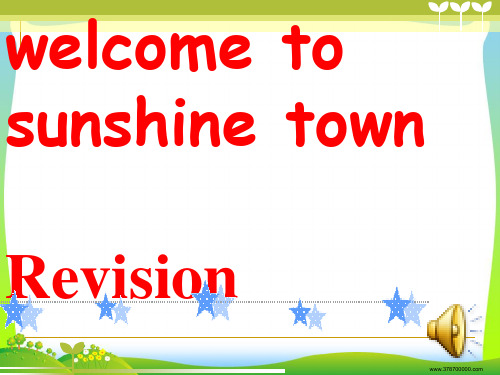
5. Tom’s family owns
(own) a new car.
6. The fish smells (smell) so nice. I can’t wait to eat!
7.It’s about ten _m___i_n__u_t_e__s_’__ ( minute) walk from here to the playground. 8. Our school is very big, but theirs (their) is small.
2. Pmleinasee give this to Susan. It is
________ pen.
3. hWeerare working hard on ______ project.
The teacher will like it.
our
4. My cousins and I live in the same building. My flat is on the third floor. _T_h_e_i_rs____ is on the tenth floor.
单词背诵2
12. 划船 13. 旅馆 14. 拥有,所有 15. 家乡 16. 友好的 17. 饲养 18. 生长,发育 19. 嗅,闻到 20. 驾驶,开车 21. 等一会儿 22. 盼望,期待 23. 艺术品 24. 钥匙扣 25. 到处,遍及
12. row 13. hotel 14. own 15. hometown 16. friendly 17. raise 18. grow 19. smell 20. drive 21. wait a minute 22. look forward to 23. work of arts 24. key ring 25. all over
牛津译林版初中英语七年级英语下册Unit3学案及习题【含答案】
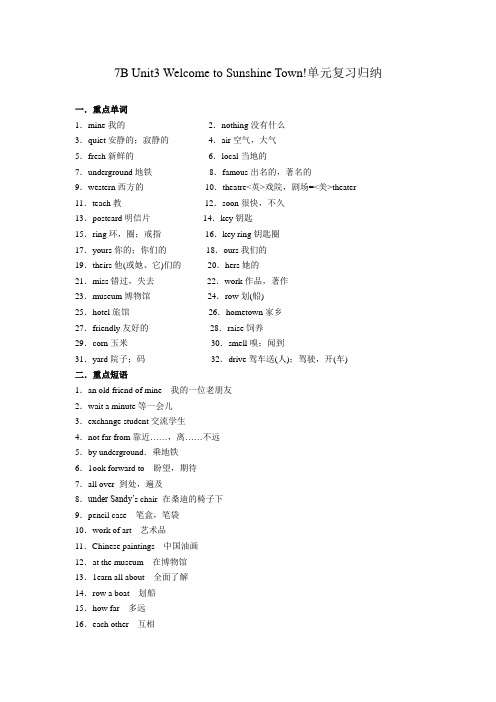
7B Unit3 Welcome to Sunshine Town!单元复习归纳一.重点单词1.mine我的2.nothing没有什么3.quiet安静的;寂静的4.air空气,大气5.fresh新鲜的6.local当地的7.underground地铁8.famous出名的,著名的9.western西方的10.theatre<英>戏院,剧场=<美>theater 11.teach教12.soon很快,不久13.postcard明信片14.key钥匙15.ring环,圈;戒指16.key ring钥匙圈17.yours你的;你们的18.ours我们的19.theirs他(或她、它)们的20.hers她的21.miss错过,失去22.work作品,著作23.museum博物馆24.row划(船)25.hotel旅馆26.hometown家乡27.friendly友好的28.raise饲养29.corn玉米30.smell嗅;闻到31.yard院子;码32.drive驾车送(人);驾驶,开(车)二.重点短语1.an old friend of mine 我的一位老朋友2.wait a minute等一会儿3.exchange student交流学生4.not far from靠近……,离……不远5.by underground.乘地铁6.1ook forward to 盼望,期待7.all over 到处,遍及8.under Sandy’s chair 在桑迪的椅子下9.pencil case 笔盒,笔袋10.work of art 艺术品11.Chinese paintings 中国油画12.at the museum 在博物馆13.1earn all about 全面了解14.row a boat 划船15.how far 多远16.each other 互相17.go shopping 去购物18.on a farm 在农场19.hear the birds sing 听到鸟儿歌唱20.raise cows 养牛21.show sb.Around 带领某人参观22.a wonderful place to live 一个居住的好地方三.重点句子及点拨1.An old friend of mine is coming to see me,Hobo.霍波,我的一位老朋友要来看我。
广州牛津英语7七年级下unit 3 复习一
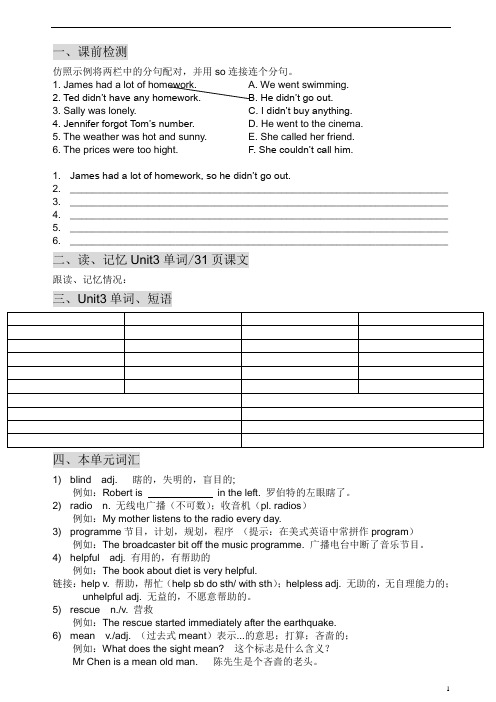
一、课前检测仿照示例将两栏中的分句配对,并用so连接连个分句。
1. James had a lot of homework. A. We went swimming.2. Ted didn’t have any homework. B. He didn’t go out.3. Sally was lonely. C. I didn’t buy anything.4. Jennifer forgot Tom’s number. D. He went to the cinema.5. The weather was hot and sunny. E. She called her friend.6. The prices were too hight. F. She couldn’t call him.1. James had a lot of homework, so he didn’t go out.2. ____________________________________________________________________3. ____________________________________________________________________4. ____________________________________________________________________5. ____________________________________________________________________6. ____________________________________________________________________二、读、记忆Unit3单词/31页课文跟读、记忆情况:三、Unit3单词、短语四、本单元词汇1) blind adj. 瞎的,失明的,盲目的;例如:Robert is in the left. 罗伯特的左眼瞎了。
广州牛津版七年级英语下册Unit3Our Sense复习
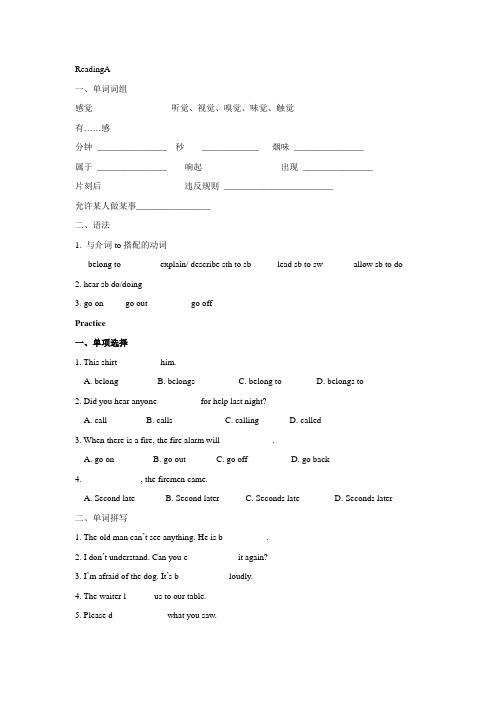
ReadingA一、单词词组感觉_________________ 听觉、视觉、嗅觉、味觉、触觉_____________________________ 有……感__________ ________ ________________ ___________分钟_________________ 秒_________________ 烟味_________________属于_________________ 响起_________________ 出现_________________片刻后_________________ 违反规则__________________________允许某人做某事_________________二、语法1. 与介词to搭配的动词belong to explain/ describe sth to sb lead sb to sw allow sb to do2. hear sb do/doing3. go on go out go offPractice一、单项选择1. This shirt _________ him.A. belongB. belongsC. belong toD. belongs to2. Did you hear anyone _________ for help last night?A. callB. callsC. callingD. called3. When there is a fire, the fire alarm will ___________ .A. go onB. go outC. go offD. go back4. _____________, the firemen came.A. Second lateB. Second laterC. Seconds lateD. Seconds later二、单词拼写1. The old man can’t see anything. He is b__________.2. I don’t understand. Can you e___________ it again?3. I’m afraid of the dog. It’s b___________ loudly.4. The waiter l______ us to our table.5. Please d____________ what you saw.三、完成句子1. 他把盲人领到了邮局。
广州新牛津版-七年级下册-Unit-3-Our-animal-friends
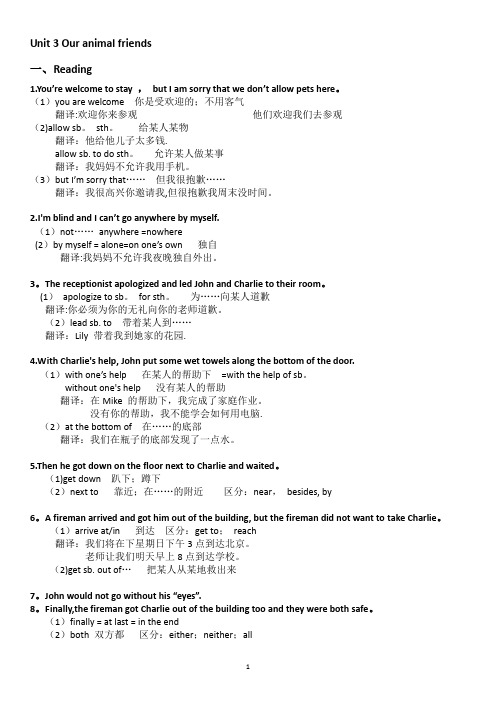
Unit 3 Our animal friends一、Reading1.You’re welcome to stay ,but I am sorry that we don’t allow pets here。
(1)you are welcome 你是受欢迎的;不用客气翻译:欢迎你来参观他们欢迎我们去参观(2)allow sb。
sth。
给某人某物翻译:他给他儿子太多钱.allow sb. to do sth。
允许某人做某事翻译:我妈妈不允许我用手机。
(3)but I’m sorry that……但我很抱歉……翻译:我很高兴你邀请我,但很抱歉我周末没时间。
2.I'm blind and I can’t go anywhere by myself.(1)not……anywhere =nowhere(2)by myself = alone=on one’s own 独自翻译:我妈妈不允许我夜晚独自外出。
3。
The receptionist apologized and led John and Charlie to their room。
(1)apologize to sb。
for sth。
为……向某人道歉翻译:你必须为你的无礼向你的老师道歉。
(2)lead sb. to 带着某人到……翻译:Lily 带着我到她家的花园.4.With Charlie's help, John put some wet towels along the bottom of the door.(1)with one’s help 在某人的帮助下=with the help of sb。
without one's help 没有某人的帮助翻译:在Mike 的帮助下,我完成了家庭作业。
没有你的帮助,我不能学会如何用电脑.(2)at the bottom of 在……的底部翻译:我们在瓶子的底部发现了一点水。
广州牛津版七年级下册Unit 3 Our animal friends More practice
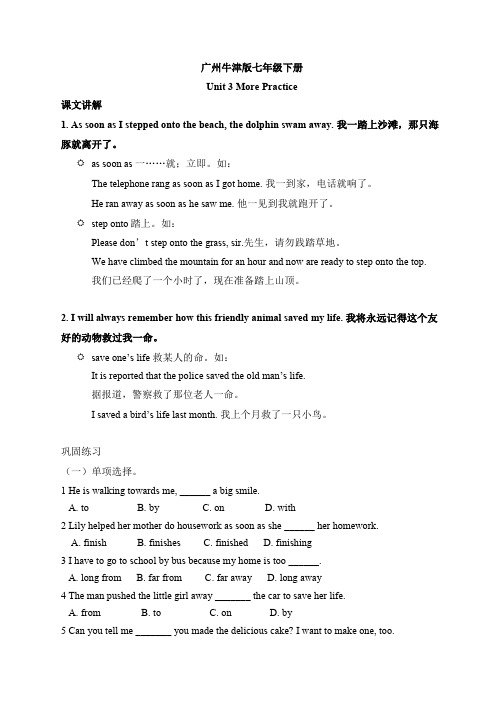
广州牛津版七年级下册Unit 3 More Practice课文讲解1. As soon as I stepped onto the beach, the dolphin swam away. 我一踏上沙滩,那只海豚就离开了。
as soon as 一……就;立即。
如:The telephone rang as soon as I got home. 我一到家,电话就响了。
He ran away as soon as he saw me. 他一见到我就跑开了。
step onto踏上。
如:Please don’t step onto the grass, sir.先生,请勿践踏草地。
We have climbed the mountain for an hour and now are ready to step onto the top.我们已经爬了一个小时了,现在准备踏上山顶。
2. I will always remember how this friendly animal saved my life. 我将永远记得这个友好的动物救过我一命。
save one’s life 救某人的命。
如:It is reported that the police saved the old man’s life.据报道,警察救了那位老人一命。
I saved a bird’s life last month. 我上个月救了一只小鸟。
巩固练习(一)单项选择。
1 He is walking towards me, ______ a big smile.A. toB. byC. onD. with2 Lily helped her mother do housework as soon as she ______ her homework.A. finishB. finishesC. finishedD. finishing3 I have to go to school by bus because my home is too ______.A. long fromB. far fromC. far awayD. long away4 The man pushed the little girl away _______ the car to save her life.A. fromB. toC. onD. by5 Can you tell me _______ you made the delicious cake? I want to make one, too.A. whatB. whyC. whichD. how答案:DCCAD(二)单词拼写。
Unit3阶段复习试题二Grammar-Task-牛津译林版七年级英语下册

阶段复习二一、根据汉语提示写出单词。
1. There are some beautiful flowers on these (明信片).2. My grandpa (饲养) some chickens on his small farm.3. The flowers (闻起来) so nice. Let's buy some.4. My grandmother (拥有)a good voice(嗓音), so she can sing Beijing opera very well.5. My grandma likes (种) flowers in the garden in spring.二、用方框中所给单词或短语的适当形式填空。
get to;own ;answer;row;have;they ;I ;key ;work;teach1.— Look! Whose are these?— Perhaps they are Sandy's.2. Who you. English this term?3.I think this question is easy .4. Can you tell me how your school?5. Would you please show your pictures?6. You can see many of art at the Palace Museum.7. They a Christmas party for the exchange students next week.8. The children are really lovely. Amy wants to buy some presents for .9. Look! The Whites a boat on the lake. How happy they are!10.I am looking forward to my own car.三、单项选择。
牛津译林版七年级英语下册unit3单元知识点归纳总结

牛津译林版七年级英语下册7B Unit3 Welcome to Sunshine Town1. Passage1)Sunshine Town is a new town in Beijing, the capital of China. It’s only 40 minutes from the centre of Beijing by underground. There is less air pollution in Sunshine Town than in other areas of Beijing. There is a country park. The country park is beautiful. It’s name is Sunshine Park. You can go walking there. You can see green hills, trees and lakes too.2) Eat Chinese food? If so, you are here in the right place! How many restaurants are there in Sunshine Town? It’s hard to say. You can choose any food you like in Sunshine Town. You can try Beijing Duck in one of the Chinese restaurants in Star Shopping Mall. How much Beijing Duck can you eat? If you don’t like Chinese food, There are lots of Western restaurants too.2. Word and phrase1) have to do sth. 必须/不得不做某事(客观)must:必须(主观)don’t/doesn’t have to do sth .= needn’ t do sth.不必做某事例:She has to get up at 9 o’clock every morning. 她不得不在每天早上9点钟起床。
牛津译林版英语 七年级下册 Unit 3 单元巩固与复习 课件(共22张PPT)
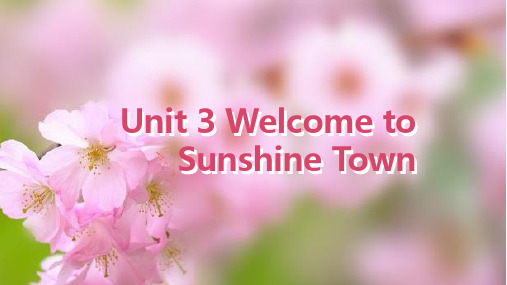
invite sb to do sth
盼望某物/做某事
look forward to sth / doing sth
期待着见到你
look forward to meeting you
带某人去某地
take sb to +地点
带他们去电影院
take them to the cinema
带男孩子们去我们学校的足球场 take the boys to our school's
mine pron.我的 nothing pron. 没有什么 yours pron. 你的, 你们的 ours pron. 我们的 theirs pron. 他(或她、它)们的 hers pron. 她的
动词
miss vt.错过,失去 row vt. 划(船) own vt. 拥有,所有 raise vt. 饲养 smell vt. 嗅,闻到 drive vt.&vi. 驾车送(人);驾驶,开(车) grow vt. &vi. (使)生长,发育;长大,长高 副词
闻花香
smell the flowers
点个比萨饼
order a pizza
稍等
观看一些精彩电影
watch some wonderful films
品尝一些中国食物
try some Chinese food
呆在安静的城镇
stay in a quiet town
居住在像这样的房屋里 live in houses like this
Is it enough for a tin of dog food? 5. 我们也许可以点一份披萨。
Maybe we can order a pizza. 6. 我们可以带他们去电影院吗?
广州牛津版英语七年级下Unit3

广州牛津版英语七年级下Unit3编辑整理:尊敬的读者朋友们:这里是精品文档编辑中心,本文档内容是由我和我的同事精心编辑整理后发布的,发布之前我们对文中内容进行仔细校对,但是难免会有疏漏的地方,但是任然希望(广州牛津版英语七年级下Unit3)的内容能够给您的工作和学习带来便利。
同时也真诚的希望收到您的建议和反馈,这将是我们进步的源泉,前进的动力。
本文可编辑可修改,如果觉得对您有帮助请收藏以便随时查阅,最后祝您生活愉快业绩进步,以下为广州牛津版英语七年级下Unit3的全部内容。
Unit 3reception n. 接待处;接待区clerk n.(旅馆服务台)接待员;职员blind adj. 失明的;瞎的explain v. 解释lead v. 带路;引领exit n. 出口safety n。
安全describe v. 描述;形容asleep adj。
睡着的bark v. (狗)吠叫loudly adv. 大声地smell v. 闻到 n. 嗅觉smoke n 烟fire alarm n。
火警towel n. 毛巾;手巾dead adj. 不运行的;不转动的minute n. 分钟fire engine n。
消防车against prep。
与……相反;反对mostly adv。
主要地perfume maker n。
香水制造者sense n。
感觉官能(即视、听、嗅、味、触五觉)useful adj。
有用的taste n. 味觉close v。
闭上;关闭programme n。
节目skill n。
技术;技能hearing n。
听力;听觉sight n。
视力;视觉deaf adj. 聋的;失聪的simple adj。
简单的;容易的able adj。
能够chance n。
机会sign language n。
手语disability n。
缺陷;障碍left n. 左边;左方opposite prep 。
在……对面cupboard n。
- 1、下载文档前请自行甄别文档内容的完整性,平台不提供额外的编辑、内容补充、找答案等附加服务。
- 2、"仅部分预览"的文档,不可在线预览部分如存在完整性等问题,可反馈申请退款(可完整预览的文档不适用该条件!)。
- 3、如文档侵犯您的权益,请联系客服反馈,我们会尽快为您处理(人工客服工作时间:9:00-18:30)。
1) 用适当的反身代词填空
1. My classmate, Li Ming, made a card for _________ just now.
2. Bad luck! I cut _________ with a knife yesterday.
3. They tell us they can look after_________ very well.
反身代词构成口诀:
反身代词构成并不难,单数词尾-self记心间。第三人称宾格加在前,
其余物主开头用在先。复数形式如何变,f要用ves来替换。
2. 方位介词 on意为“在……的上面”;over意为“在……(垂直)的正上方”;above意 为“在……(不一定垂直)的上方”;under意为“在……(垂直的)正下 方”;below意为“在……(不一定垂直)的下方”;near意为“在……附 近”;next to意为“紧挨着……”;round / around意为“在……周围”;by 意为“在……旁边”;表示两者的位置关系时in表示“在同一区域内或同一 范围内”;on表示“接壤;相邻”;to表示“相离;相隔”,两者不属同一范 围,也不接壤。
help oneself to sth等。
如:I could not dress(myself)up at that time. 那个时候我不能打扮
我自己。
注:有些动词后不跟反身代词,如:get up, sit-down, stand up,
wake up等。
如:Please sit down. 请坐。
(错) Myself drove the car.
(对) I myself drove the car. 我自己开车。
b. 但在and,or,nor连接的并列主语中,第二个主语可用反身代词,特
别是myself 作主语。例如:Charles and myself saw it. 查尔斯和我看见
了这件事。
yourself.
4. 在不强调的情况下,but, except, for 等介词后宾语用反身代词
或人称代词宾格均可。 如:No one but myself(me)is hurt.
5. 有时,我们使用by oneself的形式,其含义为alone(单独地,独自
地)。
如:She learnt English by herself.
way to...去..的路上 4. to的的用法 1) 表示“到,前往”。如:go/come/return/walk to 2) 在here, there, home前要省略介词。如:I usually walk there. 3) from...to表示“从...到...”。如:We walked from the hotel to the
6. 反身代词通常用于某些固定搭配中。
如:all by oneself独自
learn by oneself自学 think to oneself暗
暗地想
say to oneself 自言自语 teach oneself 自学 leave one by oneself
把某人单独留下注意:
a. 反身代词本身不能单独作主语。
station. 5. next to(beside), between, in front of ,opposite及behind的用法
1) next to(beside)表示“在旁边”。如:I sit next to/beside John.我坐
在约翰的旁边。
2) between表示“在...之间”。如:I sit between John and Lily.我坐在
--I’d love to, I can’t. I have a lot of homework to do. A. or B. but C.so D. and ( )9. –Can you play football?
-- Yes, I can I can play it very well. A. or B. so C. and D. but
8. The blind girl lost_________ in the beautiful music.
9. Xiao Hui, can you introduce _________ to us ?
10. Bill wants to teach_________ French from now on.
towards her.
As soon as: 一…就… (主将从现)
I
(phone) you as soon as I
(arrive) in Beijing.
五、知识考点
1. 反身代词 构成 表示某人自己的代词叫做反身代词。它表示一个动作回到该动作执行者 的本身,或者强调自己。它有人称和数的变化。如下表格
enjoy,hurt,introduce,behave等。如: We enjoyed ourselves very
much last night. 我们昨晚玩得很开心。
Please help yourself to some fish. 请你随便吃点鱼。
b. 用于及物动词+宾语+介词,如take pride in, be annoyed with,
人称代
I
you
he
she
it
词主格
反身代 myself yourself himself herself 词
itself
人称代词
we
you
主格
反身代词 ourselves yourselves
另外:one的反身代词为oneself 用法 1. 做宾语
they themselves
a. 有些动词需有反身代词,如absent, bathe,blame dry,cut,
2) 用介词填空
1. Shanghai is located _______ the east of China.
2. Handan is _______ the south of Hebei province.
3. Hainan is _______ the south of China.
4. Japan is _______ the east of China.
二、读、记忆Unit3单词/40页课文
跟读、记忆情况:
三、Unit3单词、短语
四、本单元词汇
1) nothing = no …anything 没有东西
There is nothing in the bag. =
.
2) see sb do sth 和 see sb doing sth.
see sb do sth: 看见某人做某事的整个过程;
newspaper/book在报纸上/书上 in the world在世界上 in the middle of在...中间 2. at的用法 1) 表示“十分靠近”。常见短语有: at the bus stop在车站 at the door在门口at the traffic lights在红绿灯前 at the desk在书桌 2) 用于以下短语:at home在家 at work/school上班/上学 at university/college 上大学 at the station/airport 在车站/机场 at Jane’s (house)/my sister’s/the doctor’s /hairdresser’s在简在家/在 我妹妹家/在诊所/在理发店.... 3) in/at表示“在...里面”,与建筑物(hotel, restaurant, hospital等)连用 时,可互换。
约翰和莉莉之间。
3) in front of表示“在...前面”。behind表示“在...后面”。opposite表
示“在...正对面”
如:I sit behind John./ John sits in front of me. 我坐在约翰的后面。/约
翰坐在我前面
6. under表示“不与表面接触但垂直表面的正下方”。如:The cat is
see sb doing sth: 看见某人正在做某事。
I saw some boys
(play) football in the playground. (正在踢足
球)
3) push… away: 将…推开
The policeman
the old lady when he saw the bus coming
1. in的用法 1) 表示在“一个被包围的空间中”如:in a room/shop/a car 2) 表示在“一大片平面的地域内”。如:in a garden/a town/the city
center/France 3) 常用在以下短语:in bed卧床,睡觉 in the sky在天空中 in a
under the chair.
7. above表示“不与表面接触且不一定垂直的上方”。如:A
is
above the line. A在线上。
8. below表示“不与表面接触且不一定垂直的下方”。如:A
is
below,紧靠”。如:Our house is by the sea.我
2. 用作表语,如结构be oneself. 如:I am not myself today. 我今天
不舒服。
3. 用作同位语,用来加强语气,表示“本人”,或者“亲自”
如:The thing itself is not important. You’d better borrow the book
4. My cat can find food by_________ .
5. Help __________to some beef, boys.
